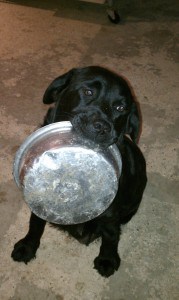How to Talk to a Breeder
What questions should I be asking my breeder? How do I get the breeder to return my phone call? What should I NOT be saying to the breeder? How does a breeder decide who gets a puppy?
If you’ve asked yourself some of these questions or are wondering what’s the appropriate way to speak to a breeder, you may find some answers here!
Finding a reputable breeder can be overwhelming. There’s so much out there about avoiding a “puppy mill.” So what are the responsibilities of a good breeder? We’ve covered some of those things already on our website. But there are also ways to avoid offending a breeder that you’re hoping to get a puppy from. The biggest ‘oops’ you can make in contacting a breeder, is to begin your conversation with “Are you a puppy mill?”. I understand the intent behind this question, but that is basically insinuating that the breeder you are approaching has inhumane conditions and doesn’t take proper care of his/her dogs. So bottom line… it’s incredibly offensive. In addition, if you really WERE contacting a puppy mill…would they really admit it? Unlikely.
There are various ideas of what constitutes a puppy mill. According to the ASPCA, a puppy mill is “a large-scale commercial dog breeding operation that places profit over the well-being of its dogs—who are often severely neglected—and acts without regard to responsible breeding practices.” Some extremists might say breeding a dog at all is inhumane (but if you’re trying to find a good breeder to buy a puppy from, I’m assuming we can bypass that discussion) However, the most common denominator in any definition of a puppy mill, is the association of inhumane conditions and practices and neglect. If you’re finding that this breeder is spending thousands of dollars on health clearances for their dogs, standing by them with health guarantees, putting them in the show ring (and doing well!), and clearly not cutting corners cost wise, you’ve probably already avoided a dreaded puppy mill. Related: Me and My Labs!!! (a brief history) The next tip I can give you is to take the time to read the breeder’s website before contacting them. We have spent years building our website so that many questions can be answered by taking the time to read through it. I promise it will answer many of your questions before you even speak with me. Please do not be offended when I refer you to the website to gain more knowledge of our breeding program. I could easily take up an hour of your time on the phone going into details that we openly include right online! 🙂 We certainly don’t want to waste your valuable time. Our goal is to educate puppy buyers and pet owners before bringing their pups home so that they are well prepared and ready to spend the next 15+ years of their life with their new labby loves! That’s why we put so much time into our website to make it more than “Here’s our kennel, here’s our puppies, here’s how to buy one.” Knowing what health issues we can prevent and clear against and what we can’t is also important. Be careful of stating something like, “I don’t think our last dog came from a reputable breeder, he ended up with a torn ACL…” Torn ACL’s are injuries (usually of dogs that have been neutered or spayed too early before the growth plates are formed–or by over-exercise) It’s not a result of poor breeding. Unfortunately cancer is something else that is not so easy to rule out. A breeder can track any cases of it to see if it may run in a certain line, but otherwise there’s no gene/genetic marker to single out as with EIC, PRA, CNM, etc. There are too many unknowns with cancer (just like in people). Related: What is PRA: Progressive Retinal Atrophy in Labradors? Taking the advice from a breeder with years of experience in a breed is not a bad idea. We have seen and heard just about everything, and the most important thing to remember here is it’s all breed specific. A veterinarian has been trained in general canine health, but its impossible for them to know all of the specific health issues and growth rates and characteristics of each breed. Chances are we may have insight into Labrador health, and our bloodlines, that they may be unaware of. Please, please develop a good vet, breeder, and client (YOU) relationship. It will benefit you and your dog, in the long run. A good breeder will recommend you feed your dog a quality dog food (and supplement). Nine times out of ten if you call me with a health issue, it is nutritionally related, but will always approach it holistically. We recommend specific foods because we have done the research, knowing the specific nutritional needs of Labradors and large breeds, educated ourselves, and have EXPERIENCE with those foods. We also don’t want to experience unnecessary allergies, GI issues, or health issues linked to nutrition.
Knowing what health issues we can prevent and clear against and what we can’t is also important. Be careful of stating something like, “I don’t think our last dog came from a reputable breeder, he ended up with a torn ACL…” Torn ACL’s are injuries (usually of dogs that have been neutered or spayed too early before the growth plates are formed–or by over-exercise) It’s not a result of poor breeding. Unfortunately cancer is something else that is not so easy to rule out. A breeder can track any cases of it to see if it may run in a certain line, but otherwise there’s no gene/genetic marker to single out as with EIC, PRA, CNM, etc. There are too many unknowns with cancer (just like in people). Related: What is PRA: Progressive Retinal Atrophy in Labradors? Taking the advice from a breeder with years of experience in a breed is not a bad idea. We have seen and heard just about everything, and the most important thing to remember here is it’s all breed specific. A veterinarian has been trained in general canine health, but its impossible for them to know all of the specific health issues and growth rates and characteristics of each breed. Chances are we may have insight into Labrador health, and our bloodlines, that they may be unaware of. Please, please develop a good vet, breeder, and client (YOU) relationship. It will benefit you and your dog, in the long run. A good breeder will recommend you feed your dog a quality dog food (and supplement). Nine times out of ten if you call me with a health issue, it is nutritionally related, but will always approach it holistically. We recommend specific foods because we have done the research, knowing the specific nutritional needs of Labradors and large breeds, educated ourselves, and have EXPERIENCE with those foods. We also don’t want to experience unnecessary allergies, GI issues, or health issues linked to nutrition. Another interesting note is that many breeders turn away first-time dog owners or ones with children (especially if in the background it sounds like chaos as we speak with you on the phone…perhaps it may not be the right atmosphere we’d want our lab to be in). We are not of this mindset, however, we do spend much more time educating those buyers as there is so much to prepare for in getting a new pup. Read an article we wrote just for the first-time dog owners out there! Knowing the difference between temperament and personality, nature vs. nurture, and proper training is KEY. We breed for temperament in ALL of our litters. In asking which litter would have better temperament, you are essentially implying that I am only breeding certain litters to be well-tempered family dogs. We have sculpted our breeding program over the last 30 years by keeping and breeding dogs that exhibit a perfect Labrador temperament. ***NOTE: Good temperament does NOT mean the puppy doesn’t require training. ALL puppies need training. Don’t say, “I want the puppy that does not bark.” Or “I want the pup that is (fill in the blank).” Remember, we can put all our genetics into your dog for temperament and trainability, socialize it for 8 weeks… and yet have the new puppy owner ruin that pup within the first 24 hours. As soon as you walk out my door, you are training your pup. I hope that this has given you some food for thought in how to interact with your breeder/potential breeder, so that you can have a good working relationship and ensure a better experience for you and your pup!!!
Another interesting note is that many breeders turn away first-time dog owners or ones with children (especially if in the background it sounds like chaos as we speak with you on the phone…perhaps it may not be the right atmosphere we’d want our lab to be in). We are not of this mindset, however, we do spend much more time educating those buyers as there is so much to prepare for in getting a new pup. Read an article we wrote just for the first-time dog owners out there! Knowing the difference between temperament and personality, nature vs. nurture, and proper training is KEY. We breed for temperament in ALL of our litters. In asking which litter would have better temperament, you are essentially implying that I am only breeding certain litters to be well-tempered family dogs. We have sculpted our breeding program over the last 30 years by keeping and breeding dogs that exhibit a perfect Labrador temperament. ***NOTE: Good temperament does NOT mean the puppy doesn’t require training. ALL puppies need training. Don’t say, “I want the puppy that does not bark.” Or “I want the pup that is (fill in the blank).” Remember, we can put all our genetics into your dog for temperament and trainability, socialize it for 8 weeks… and yet have the new puppy owner ruin that pup within the first 24 hours. As soon as you walk out my door, you are training your pup. I hope that this has given you some food for thought in how to interact with your breeder/potential breeder, so that you can have a good working relationship and ensure a better experience for you and your pup!!!

“I’ll love you forever, I’ll like you for always… as long as I’m living, my baby you’ll be…” -Willow (Quill x Manny)
To see more pictures of Endless Mt. Labs and their families, read our testimonials!
More from the EML Blog:
What is an AKC Breeder of Merit and Why Should I Care??





9 Comments